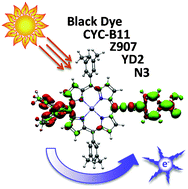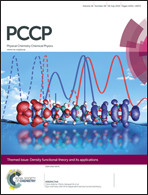The nature of vertical excited states of dyes containing metals for DSSC applications: insights from TD-DFT and density based indexes†
Abstract
Transition metal complexes, typically Ru-based complexes, are the most efficient dyes used in dye-sensitized solar cells. The absorption spectra of these molecules generally involve numerous electronic transitions, which are not equivalent for the conversion of the light into electricity. In the present manuscript, an analysis of each electronic transition of selected inorganic complexes is performed based on the variation of the electronic density upon light absorption. To this end, a series of indices recently proposed in the literature is applied. The main conclusions of this work are twofold: from a methodological point of view, global hybrid functionals confirm their robustness for studying the electronic transitions of these compounds and from an application oriented point of view it is clear that the most intense transitions are not necessarily the most efficient ones for the light conversion.

- This article is part of the themed collection: Density functional theory and its applications

 Please wait while we load your content...
Please wait while we load your content...